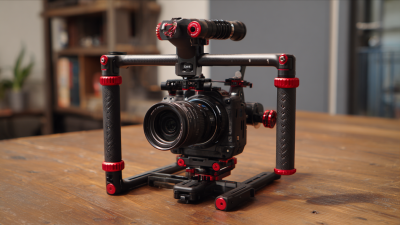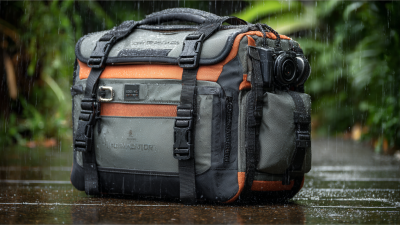As the filmmaking industry continues to evolve, the demand for high-quality visuals has driven innovations in equipment, particularly in the realm of Professional Camera Stabilizers. According to a report by MarketsandMarkets, the global camera stabilizer market is projected to reach $1.2 billion by 2025, with a CAGR of 5.8% from 2020 to 2025. This surge is largely attributed to the increasing use of stabilizers in various sectors, including film production, live events, and content creation for digital platforms.

The advancement of technology has led to the development of sophisticated stabilizers, such as gimbals and handheld devices, that enhance shooting capabilities and provide filmmakers with unprecedented creative control. As we explore the future of Professional Camera Stabilizers, we will delve into the latest trends, innovative solutions, and the overall market growth that is shaping the future of filmmaking.
The filmmaking industry is currently witnessing a significant transformation with the advent of innovative camera stabilizer technologies. Emerging trends reflect a growing emphasis on versatility and portability, enabling filmmakers to capture stunning visuals with ease. The increasing popularity of smaller, more adaptable gimbals caters to the needs of both amateur creators and industry veterans, allowing them to achieve professional-grade stabilization without the bulk of traditional equipment. This shift not only makes high-quality cinematography accessible to a broader audience but also encourages creativity in storytelling.
With a projected market growth indicating a strong demand for camera stabilizers, advancements in technology play a pivotal role in shaping filmmakers’ experiences. The integration of intelligent features, such as automatic balancing and advanced motion tracking, is enhancing the functionality of these stabilizers. Additionally, new designs that accommodate smartphone cameras reflect the ongoing trend of merging professional tools with everyday devices, promising a future where filmmaking is increasingly democratized. As new players enter the market, incorporating unique innovations, it will be exciting to see how these developments influence the artistic landscape and the tools available for content creators.
The evolving landscape of camera stabilizers in the filmmaking industry is marked by innovative features that cater to the demands of both professionals and amateur filmmakers. With advancements in technology, next-generation stabilizers are set to incorporate features such as enhanced artificial intelligence algorithms for automatic balancing, improved battery life, and the integration of mobile app controls. According to a recent industry report by MarketsandMarkets, the global market for camera stabilizers is projected to grow from $1.23 billion in 2022 to $2.51 billion by 2028, highlighting the demand for these high-tech tools.
One of the standout innovations is the development of gimbals that utilize 3-axis stabilization systems, which provide smoother footage even in dynamic shooting environments. Filmmakers should also look for stabilizers with customizable settings that adapt to various shooting styles, from handheld use to drone integration. As noted by a report from ResearchAndMarkets, the market for handheld stabilizers alone is expected to increase significantly, indicating a shift towards versatility in filming equipment.
**Tip:** When selecting a stabilizer, consider models that offer quick-release mechanisms for seamless transitions between shooting setups. Additionally, investing in a stabilizer with weather-resistant features can safeguard your equipment during outdoor shoots. Remember, it’s not just about preventing shake; it's about enhancing your creative storytelling through steady, professional-grade shots.
As the demand for high-quality visual content continues to surge, the filmmaking industry is witnessing a significant influence from market demand on the development of professional camera stabilizers. Filmmakers and content creators are increasingly seeking tools that not only stabilize their shots but also enhance the overall production value. This shift in consumer expectations is prompting manufacturers to innovate and improve their offerings, resulting in more versatile and user-friendly stabilizers that cater to both amateur and professional filmmakers.
Emerging trends in the market, such as the rise of compact and lightweight stabilizers, are making it easier for creators to capture smooth footage in diverse settings. The integration of advanced technologies, such as artificial intelligence and smart algorithms, is also revolutionizing the functionality of these devices. Consequently, we are seeing a broader adoption of camera stabilizers across various segments of the industry, including independent filmmaking, corporate video production, and social media content creation. The interplay between market demand and technological advancements is shaping the future of camera stabilizers, ensuring they remain essential tools in the ever-evolving landscape of visual storytelling.
The advent of AI and automation is transforming the world of camera stabilization in filmmaking, offering creators unprecedented precision and ease of use. Camera stabilizers have traditionally required skilled operators to achieve smooth footage; however, the integration of AI technology is allowing devices to autonomously adjust to dynamic shooting environments. This innovation not only enhances the overall production quality but also enables filmmakers to focus more on their creative vision instead of technical constraints.
Tip: When using AI-powered stabilizers, familiarize yourself with the device's settings to take full advantage of its capabilities. Customizing the stabilization parameters can provide smoother motion control adapted to various shooting scenarios.
Furthermore, automation within these systems is streamlining workflows, making it easier for solo filmmakers or small teams to capture high-quality shots without needing extensive manpower. Automated tracking features, for instance, can keep the subject in frame effortlessly as they move, making it ideal for action sequences or documentary-style filming.
Tip: Test out different tracking modes before your shoot. Understanding how these features work in advance can save you time and ensure you are well-prepared to handle unforeseen challenges during production.
The evolution of professional camera stabilizers is pivotal in shaping the future of filmmaking gear, particularly as filmmakers strive to produce smooth, high-quality footage. Recent industry reports project that the global camera stabilizer market will witness a compound annual growth rate (CAGR) of over 8% through 2027. This growth is primarily driven by the rise of smartphone filmmaking and the increasing demand for high-quality video content across various platforms.
As filmmakers look to future-proof their gear, it's essential to adapt to the latest innovations in stabilizer technology. Features such as AI-assisted stabilization and lightweight materials are transforming the way content creators work. Innovators focusing on ergonomics and integration with other gear are making stabilizers more user-friendly, which is particularly appealing to the new generation of filmmakers, who prioritize mobility and versatility. With the market expanding, it's vital for professionals to stay ahead by investing in the latest developments in stabilizer technology, ensuring their craft remains competitive in an increasingly digital landscape.
| Year | Market Size (USD Billion) | Growth Rate (%) | Key Innovations | Adoption Rate (%) |
|---|---|---|---|---|
| 2021 | 1.2 | 5.0 | 3-Axis Stabilization, Lightweight Materials | 30 |
| 2022 | 1.5 | 6.5 | Smart Motion Control, App Integration | 40 |
| 2023 | 1.8 | 8.0 | Portable Designs, Automated Calibration | 50 |
| 2024 | 2.1 | 10.5 | AI-Based Stabilization, Enhanced Battery Life | 60 |
| 2025 | 2.5 | 12.0 | Virtual Reality Integration, Modular Systems | 70 |






